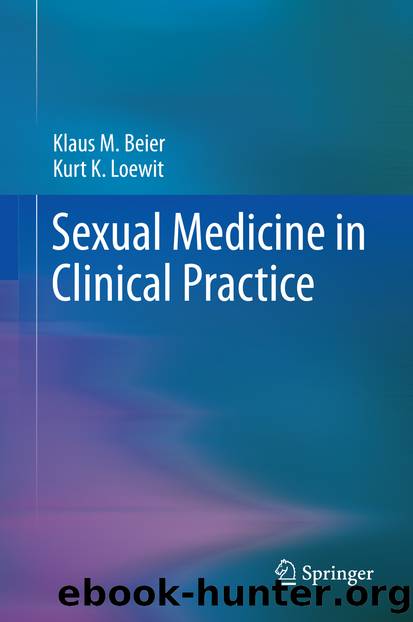Sexual Medicine in Clinical Practice by Klaus M. Beier & Kurt K. Loewit

Author:Klaus M. Beier & Kurt K. Loewit
Language: eng
Format: epub
Publisher: Springer New York, New York, NY
Keeping this in mind, the following describes a biopsychosocial, couple- and relationship-centred sexual therapy.
6.1.3 The Dual Role of the Therapist as an Expert and an Attendant
A disease-oriented and patient-oriented perspective means a challenge concerning two emphases or roles of the physician: the medical expert and the empathic assistant.
In German-speaking countries, during standard undergraduate medical training, a certain image of a physician is conveyed, which depicts him/her as a caring helper and healer but at the same time as a person thinking in terms of âobjectiveâ natural science, occasionally a distanced expert observer and responsible problem solver and solution finder, the success of therapy depending on his/her skills and knowledge. He/she knows, what is best for his/her patients, clarifies, educates, teaches, gives authoritative orders and advice to be followed in trust by his/her patients. He/she might find it difficult to cope with âinformed patientsâ, especially when confronted with resistance and contradiction, strong emotions might make him/her insecure and helpless, i.e. they activate his/her (subconscious) defence mechanisms and this additionally puts a strain on the doctorâpatient relationship as an essential healing remedy.
The secondâalso aspiredâimage of the doctor aims at exactly that patient-focused conduct as an empathic companion, a good patient listener who âreads between the linesâ, who tries to assess the patientâin this case the coupleâin their overall situation. To achieve this he/she applies his/her own reflected experiences at each ongoing doctorâpatient relationship as a diagnostic instrument, as has been previously worked out, particularly by Balint (1957, 1975). Within the âBalint Groupsâ, named after him, these abilities can be learnt and practiced (Loewit 2005; Kress and Loewit 2012), which is done more and more in regular medical training, while in psychology and psychotherapy it is general state of the art. Sexual medicine, however, is no âpsycho subjectâ and, sexual therapy is not a specialized form of psychotherapy, which is why specialists such as urologists, andrologists, gynecologists, dermatologists, general practitioners (GPs) and psychiatrists, etc., who want to gain additional qualification in sexual medicine to add to their specialized field, definitely need to learn and train role security in this new identity as a companion, catalyst, mirror, midwife and aide to problem-solving by the patient or the couple themselves (see Chap. 6.5).
Beyond the necessity for every physician and therapist to develop his/her âsecond identityâ, this comes especially true for the couple-centred approach in diagnosis and treatment in sexual medicine. This approach, however, plays no noteworthy role in any other medical discipline.
This is why there is no means of reassurance in unsettling situations and this may lead to wanting to return to the well-rehearsed role security of the expert and knowledgeable scientist, i.e. the responsible one for solving the problems of the couple. Fact is, concerning the particular couple in question, one is actually the ânot knowledgeable oneâ, having to rely on enquiries and observations, leaving the solving of the coupleâs problems to the couple itself.
The couple heals itself, the therapist offers the necessary âsheltered workshopâ and supplies the continuity of the process. He/she would be out of his/her depth with the role of the expert as far as the couple relationship goes.
Download
This site does not store any files on its server. We only index and link to content provided by other sites. Please contact the content providers to delete copyright contents if any and email us, we'll remove relevant links or contents immediately.
Periodization Training for Sports by Tudor Bompa(8271)
Why We Sleep: Unlocking the Power of Sleep and Dreams by Matthew Walker(6721)
Paper Towns by Green John(5188)
The Immortal Life of Henrietta Lacks by Rebecca Skloot(4587)
The Sports Rules Book by Human Kinetics(4385)
Dynamic Alignment Through Imagery by Eric Franklin(4214)
ACSM's Complete Guide to Fitness & Health by ACSM(4060)
Kaplan MCAT Organic Chemistry Review: Created for MCAT 2015 (Kaplan Test Prep) by Kaplan(4012)
Livewired by David Eagleman(3772)
Introduction to Kinesiology by Shirl J. Hoffman(3769)
The Death of the Heart by Elizabeth Bowen(3619)
The River of Consciousness by Oliver Sacks(3603)
Alchemy and Alchemists by C. J. S. Thompson(3520)
Bad Pharma by Ben Goldacre(3427)
Descartes' Error by Antonio Damasio(3277)
The Emperor of All Maladies: A Biography of Cancer by Siddhartha Mukherjee(3162)
The Gene: An Intimate History by Siddhartha Mukherjee(3098)
The Fate of Rome: Climate, Disease, and the End of an Empire (The Princeton History of the Ancient World) by Kyle Harper(3067)
Kaplan MCAT Behavioral Sciences Review: Created for MCAT 2015 (Kaplan Test Prep) by Kaplan(2986)
